By MKPE ABANG
What many, including IT & Telecom Digest, have speculated to be a well-articulated plan by China’s Huawei Technologies, namely to become the world’s biggest smartphone maker, has finally become real: Huawei has revealed it aims indeed, to overtake both Samsung and Apple in smartphones.
Currently, Huawei is the world’s largest manufacturer of telecommunications equipment having overtaken Ericsson in 2012. Samsung and Apple are neck-to-neck in the smartphone business as the two leading manufacturers after Nokia slipped into oblivion. While Samsung holds an apparent global lead, Apple leads mostly in the American market.
But Huawei, which has before now not shown any serious marketing strategy on the smartphone market but preferring to weigh in heavily on the network equipment segment, has now removed the mask, to attack both Samsung and Apple – for the number one spot.
With so much control in several markets across the world already as the default network equipment supplier, Huawei stands a greater chance of becoming also the global smartphone leader if it adopts a strategy of standardising its smartphones to run cheaply on networks as either add on to the equipment sold or as bundled offers at much lower costs that can undermine and undercut competition.
In fact, Huawei has appointed an executive to lead the company’s consumer electronics business to champion the campaign to take over the number one position in smartphone from both Samsung and Apple, with a target time frame of five years by grabbing no less than 25 per cent of the global market.
“We want to be the number-one smartphone maker in the world. It’s a long distance race, and we have the patience,” said Richard Yu, the head of the company’s consumer-electronics business, at the Converge technology conference hosted by The Wall Street Journal and founders.
Over the past few years, the Chinese company has been growing rapidly as a handset maker.
Huawei has been narrowing the gap with Samsung and Apple in the global smartphone market, whose growth is slowing. In the first quarter, Huawei’s smartphone sales volume increased 59% from a year earlier, while Samsung’s sales were little changed and Apple’s sales declined 14%, according to research firm Gartner Inc. Huawei’s market share in the quarter rose to 8.3%, behind Samsung’s 23% and Apple’s 15%.
While increasing its market share, Huawei has also been focusing more on high-end products, such as its latest flagship phone, the P9, which features a dual-lens camera it developed with German optics company Leica Camera AG.
“Our growth is mainly coming from the high-end, premium segment,” Mr. Yu said. “If you want to be the leading vendor, you have to lead in the high-end.”
Mr. Yu said that Huawei’s partnership with Leica is an exclusive long-term alliance and he expects the collaborations to continue at least for the next five years.
Huawei is also pushing further into new technologies such as virtual reality. Based on its partnership with Alphabet Inc.’s Google, which provides a VR software platform, the company plans to release a new VR-compatible smartphone this fall, Mr. Yu said.
Huawei has been investing heavily to beef up its patent portfolio in order to compete with Samsung and Apple in overseas markets. Last year, Huawei spent $9.2 billion in research and development, higher than the $8.1 billion Apple reported spending but below Samsung’s $12.5 billion.
While Huawei smartphones are finding buyers in many parts of the world, the company has a minimal presence in the U.S. market.
Huawei’s telecom networking equipment, such as base stations and antennas, has been effectively banned in the U.S. after a 2012 congressional report recommended that U.S. carriers avoid Huawei’s gear, citing concerns that it could be used by Beijing to spy on Americans. Huawei has repeatedly denied such allegations.
Mr. Yu said that the U.S. cybersecurity concerns about Huawei’s networking equipment won’t affect the company’s efforts to sell smartphones in the market. “Consumers only want to have better products,” he said.
Mr. Yu said Huawei is in discussions to sell smartphones through U.S. telecom carriers, without disclosing any specific product launch plans.
At home, Huawei and other Chinese smartphone makers are grappling with a slowdown in domestic sales as the market becomes saturated. The country’s smartphone shipment growth slowed to 2.5% last year, compared with 63% in 2013, according to market research firm International Data Corp.
The cutthroat competition has also been fueled by the entry of new players hoping to replicate the success of Huawei and Xiaomi Inc. Speaking at the Converge conference, Pete Lau, founder and chief executive of smartphone maker OnePlus, said China is “a very cruel market.”
Mr. Lau said OnePlus, a small player by volume in China’s smartphone market, has taken a hard look at its product strategy and decided to keep a narrow focus on its strength: high-end smartphones.

